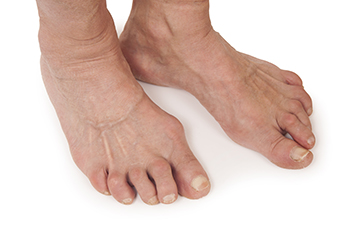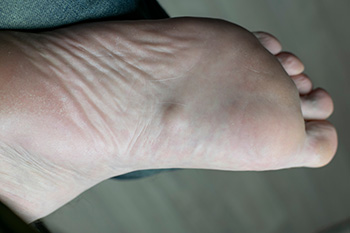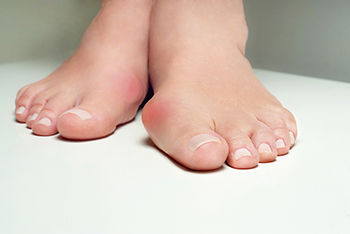Items filtered by date: May 2025
Symptoms and Causes of Rheumatoid Arthritis in the Feet

Rheumatoid arthritis, or RA, is an autoimmune condition that often affects the joints in the feet, leading to pain and inflammation. In the feet, symptoms may include swelling, stiffness, and tenderness, particularly in the toes and the balls of the feet. Some individuals may notice warmth or redness around the joints, along with difficulty walking or wearing shoes comfortably. As the condition progresses, joint deformities and reduced mobility may develop. The exact cause of rheumatoid arthritis is not fully understood, but it involves the immune system mistakenly attacking the lining of the joints. Genetic factors, environmental triggers, and hormonal changes may all play a role. Early diagnosis and proper management are important to help reduce pain, preserve joint function, and maintain quality of life for individuals affected by this chronic condition. If you have symptoms of RA and your feet are affected, it is suggested that you are under the care of a podiatrist who can help you to manage this condition.
Because RA affects more than just your joints, including the joints in your feet and ankles, it is important to seek early diagnosis from your podiatrist if you feel like the pain in your feet might be caused by RA. For more information, contact Richard DiBacco, DPM of Podiatry Associates of Erie, Inc.. Our doctor will assist you with all of your podiatric concerns.
What Is Rheumatoid Arthritis?
Rheumatoid Arthritis (RA) is an autoimmune disorder in which the body’s own immune system attacks the membranes surrounding the joints. Inflammation of the lining and eventually the destruction of the joint’s cartilage and bone occur, causing severe pain and immobility.
Rheumatoid Arthritis of the Feet
Although RA usually attacks multiple bones and joints throughout the entire body, almost 90 percent of cases result in pain in the foot or ankle area.
Symptoms
- Swelling and pain in the feet
- Stiffness in the feet
- Pain on the ball or sole of feet
- Joint shift and deformation
Diagnosis
Quick diagnosis of RA in the feet is important so that the podiatrist can treat the area effectively. Your doctor will ask you about your medical history, occupation, and lifestyle to determine the origin of the condition. Rheumatoid Factor tests help to determine if someone is affected by the disease.
If you have any questions, please feel free to contact one of our offices located in Erie and Meadville, PA, . We offer the newest diagnostic and treatment technologies for all your foot care needs.
Wounds That Don't Heal Need to Be Checked
Ankle and Foot Injuries in Gymnasts

Ankle and foot injuries are common in gymnastics due to the intense physical demands of the sport. Gymnasts often perform high-impact skills that involve repeated jumping, tumbling, and landing, all of which place tremendous force on the lower extremities. These movements, when done multiple times a day, increase the risk of overuse injuries such as stress fractures and ligament strains. Young athletes are especially vulnerable as their growing bones and joints are more susceptible to injury. Improper landing techniques, such as uneven weight distribution or poor foot alignment, can also contribute to sudden injuries like sprains or fractures. The combination of impact, repetition, and technique makes the feet and ankles particularly prone to stress. If you have sustained a foot or ankle injury during a gymnastic routine, it is suggested that you promptly visit a podiatrist who can offer effective treatment solutions.
Ankle and foot injuries are common among athletes and in many sports. They can be caused by several problems and may be potentially serious. If you are feeling pain or think you were injured in a sporting event or when exercising, consult with Richard DiBacco, DPM from Podiatry Associates of Erie, Inc.. Our doctor will assess your condition and provide you with quality foot and ankle treatment.
Common Injuries
The most common injuries that occur in sporting activities include:
- Achilles Tendonitis
- Achilles Tendon Rupture
- Ankle Sprains
- Broken Foot
- Plantar Fasciitis
- Stress Fractures
- Turf Toe
Symptoms
Symptoms vary depending upon the injury and in some cases, there may be no symptoms at all. However, in most cases, some form of symptom is experienced. Pain, aching, burning, bruising, tenderness, tightness or stiffness, sensation loss, difficulty moving, and swelling are the most common symptoms.
Treatment
Just as symptoms vary depending upon the injury, so do treatment options. A common treatment method is known as the RICE method. This method involves rest, applying ice, compression and elevating the afflicted foot or ankle. If the injury appears to be more serious, surgery might be required, such as arthroscopic or reconstructive surgery. Lastly, rehabilitation or therapy might be needed to gain full functionality in the afflicted area. Any discomfort experienced by an athlete must be evaluated by a licensed, reputable medical professional.
If you have any questions please contact one of our offices located in Erie and Meadville, PA, . We offer the newest diagnostic and treatment technologies for all your foot and ankle needs.
Risk Factors of Plantar Fibromatosis

Plantar fibromatosis, also known as Ledderhose disease, is a rare condition in which benign fibrous nodules form in the arch of the foot along the plantar fascia. These growths develop slowly and may cause discomfort or pain when walking or standing, especially if the nodules become larger or press against footwear. The exact cause is not fully understood, but several risk factors have been identified. Genetics may play a role, as the condition sometimes runs in families. People with certain medical conditions, such as diabetes, epilepsy, or liver disease, may have a higher risk. Additionally, repeated foot trauma or strain on the plantar fascia could also contribute. If you have lumps on the sole of your foot, it is suggested that you visit a podiatrist who can effectively monitor and treat this condition.
A plantar fibroma may disrupt your daily activities. If you have any concerns, contact Richard DiBacco, DPM of Podiatry Associates of Erie, Inc.. Our doctor can provide the care you need to keep you pain-free and on your feet.
Plantar Fibroma
A plantar fibroma is a fibrous knot in the arch of the foot. It is embedded in the plantar fascia which is a band of tissue that extends from the heel to the toes along the bottom of the foot. There can be multiple plantar fibromas in the feet at the same time. There are no known causes for this condition. If you have a plantar fibroma, there will be a bump in the arch of your foot that cannot be missed. Any associated pain is most often due to a shoe rubbing against the nodule. Non-surgical options, such as steroid injections, physical therapy, and orthotics should be tried first. Surgery is a last resort and is the only thing that will remove a plantar fibroma entirely. Consult with a podiatrist for a proper diagnosis and to determine the treatment regimen that is right for you.
What Causes a Plantar Fibroma?
While there are no specific causes identified, a plantar fibroma can possibly come from genetic predisposition or the formation of scar tissue that forms from healing the tears in the plantar fascia.
What Are the Symptoms of a Plantar Fibroma?
There will be a noticeable lump in the arch of the foot that may or may not cause pain. If pain is felt, it is typically because a shoe is rubbing up against the lump or when walking or standing barefoot.
Treatment and Prevention
A plantar fibroma will not disappear without treatment, but it can get smaller and be a non-issue. If pain persists, a podiatrist examines the foot and when the arch of the foot is pressed, pain can be felt down to the toes. An MRI or biopsy might be performed to help diagnose or evaluate the plantar fibroma. The following non-surgical options are generally enough to reduce the size and pain of these nodules:
- Steroid injections
- Orthotics
- Physical therapy to help apply anti-inflammatory creams on the bump
Surgery is considered if the mass increases in size and the patient continues to feel pain after non-surgical methods are tried.
If you have any questions, please feel free to contact one of our offices located in Erie and Meadville, PA, . We offer the newest diagnostic and treatment technologies for all your foot care needs.
When a Bunion Tells a Bigger Story

A bunion is more than a bump. It often signals how our feet adapt to years of pressure, imbalance, or genetics. This bony change at the base of the big toe can slowly alter the way we walk, affecting posture and even knee or hip alignment. While tight shoes and high heels are often blamed, bunions can form even in sensible footwear if foot mechanics are off. Pain, redness, or difficulty finding comfortable shoes are common complaints. Early care might involve custom inserts, padding, and toe spacers to ease pressure. In advanced cases, surgical realignment may offer lasting relief. Rather than waiting until the pain interferes with daily life, addressing a bunion early can help prevent further complications. If your big toe is drifting or causing discomfort, it is suggested that you see a podiatrist for appropriate treatment.
If you are suffering from bunion pain, contact Richard DiBacco, DPM of Podiatry Associates of Erie, Inc.. Our doctor can provide the care you need to keep you pain-free and on your feet.
What Is a Bunion?
Bunions are painful bony bumps that usually develop on the inside of the foot at the joint of the big toe. As the deformity increases over time, it may become painful to walk and wear shoes. Women are more likely to exacerbate existing bunions since they often wear tight, narrow shoes that shift their toes together. Bunion pain can be relieved by wearing wider shoes with enough room for the toes.
Causes
- Genetics – some people inherit feet that are more prone to bunion development
- Inflammatory Conditions - rheumatoid arthritis and polio may cause bunion development
Symptoms
- Redness and inflammation
- Pain and tenderness
- Callus or corns on the bump
- Restricted motion in the big toe
In order to diagnose your bunion, your podiatrist may ask about your medical history, symptoms, and general health. Your doctor might also order an x-ray to take a closer look at your feet. Nonsurgical treatment options include orthotics, padding, icing, changes in footwear, and medication. If nonsurgical treatments don’t alleviate your bunion pain, surgery may be necessary.
If you have any questions, please feel free to contact one of our offices located in Erie and Meadville, PA, . We offer the newest diagnostic and treatment technologies for all your foot care needs.




